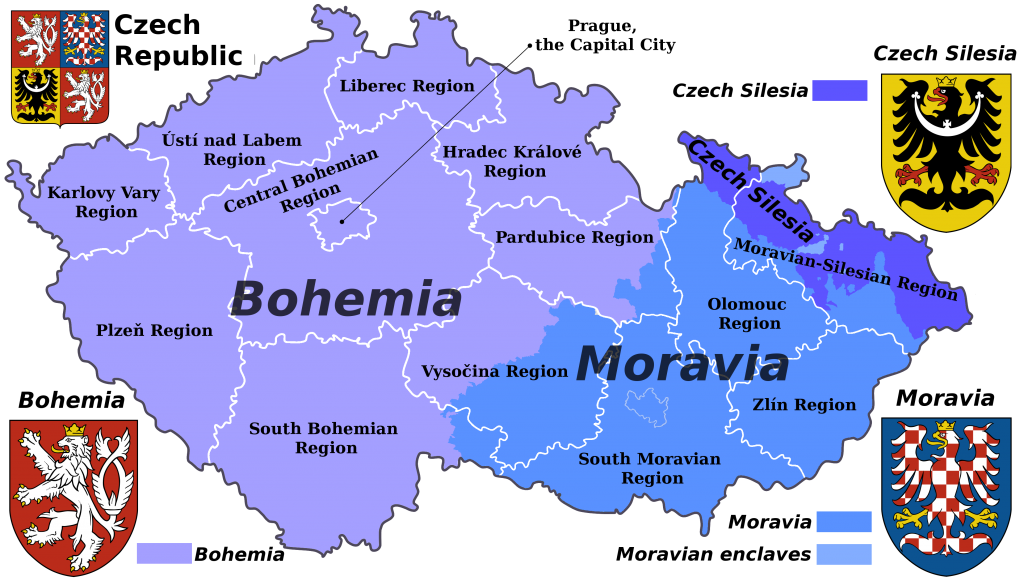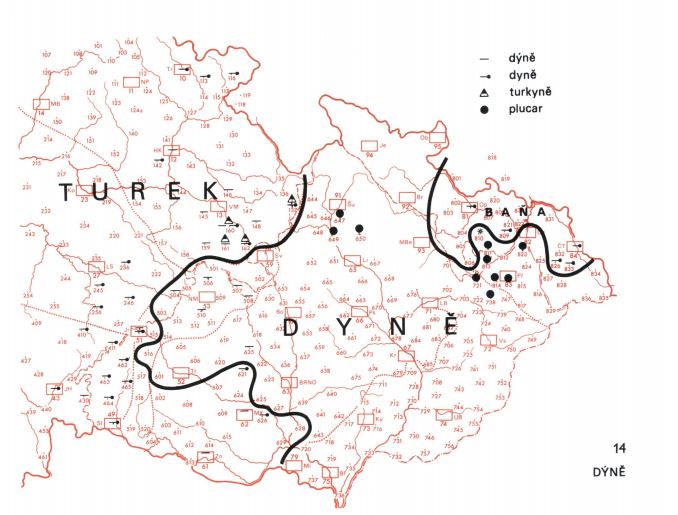
For an ordinary student from Russia, dialect is an unfamiliar thing. The Russian language developed, in general, uniformly, and therefore the probability that a person from central Russia will understand a person from Siberia is extremely high, despite huge distances by world standards.
In Czech Republic things are a bit different, and I'll try to tell you what the point is.
Introduction to Czech geography, Czech language dialects
Before coming to Czech Republic I didn't think about its geography. I knew that the capital is Prague, that somewhere there's the city Brno. I guessed that somewhere nearby are Germany and Slovakia. But I didn't delve into details, frankly speaking.
I had to get acquainted with geography literally a couple of hours after arriving in the country, because language courses were held in Poděbrady, and that's about 50 km from Prague to the east. Interestingly, Poděbrady is formally located in a different region (probably analogous to Russian "oblast"), Central Bohemian (Czech: středočeský).
Willy-nilly I learned about rivers too - Vltava, Elbe. Having settled in a bit, students began to travel, this way the full picture began to emerge.
Soon we learned that actually the Czech Republic is divided into 3 large regions: Bohemia (Czech: Čechy, attention, don't confuse the words Čechy and Česko), Moravia (Czech: Morava) and the Czech part of Silesia on the border with Poland (Czech: Slezsko). And here the most interesting begins.
Even residents of such a small country try to divide themselves by belonging to one region or another. That is, in conversation they may quite calmly tell you, for example, "I'm not Czech, I'm Moravian". But I'll note right away that there's no desire to separate from each other, no separatist sentiments, rather it's just joy from feeling yourself part of the region's history (let's take an example!).
Well and jokes flowing from that, without understanding which it will be quite difficult. From known examples - even in the song "Jožin z bažin", so popular on the internet, it sings among other things about the attitude of Praguers to Moravia:
Jedu takhle tábořit škodou sto na Oravu.
Spěchám, proto riskuji, projíždím přes Moravu.
Řádí tam to strašidlo, vystupuje z bažin,
žere hlavně Pražáky, jmenuje se Jožin.
Approximate translation:
I'm riding in a Škoda-100 to camp on Orava
I'm hurrying, taking risks, because I'm going through Moravia.
There lives a monster, comes out of swamps,
Feeds mainly on Praguers, Jožin is its name.
For clarity I'll also attach a map, useful for general understanding of the whole picture:

And here it's worth making the first sad conclusions - the language in different regions of Czech Republic differs slightly.
Is this a problem? The answer is not quite.
In theory, every successful graduate of a language school will be ready to speak Czech with everyone, even with Slovaks :) This happens thanks to such an interesting phenomenon as language redundancy.
In a nutshell - despite the fact that a person doesn't perceive absolutely all information that enters the brain (due to noise, speech defects, situation peculiarities), the human brain has the ability to perceive available information and correctly supplement it to grasp all 100%.
I'll give an example: try to read the inscription

Most likely, you'll be able to read 100% of the inscription despite the fact that I cut off more than 30%. Perhaps you didn't even notice the trick. With oral speech it's the same, and over years the brain is able to recognize more and more information using less and less available quantity.
Conclusion - there's nothing terrible in dialects, but you need to be alert.
Colloquial Czech language
This is the second problem that a newly-minted student will face. I'll return to it in following articles, but I'll tell briefly now too.
Imagine a situation where you, all such a good fellow, studied-passed Czech language, scored a bunch of points, spending a lot of time learning Czech forms of declensions, conjugations, etc.
And now, the X-hour came, you went out on the street and what will you hear there? Right, complete confusion.
I'll give an example - often the letter "ý" in speech is replaced with more convenient "ej", thus from the verb "být" (to be) comes "bejt" (don't advise pronouncing aloud, you'll get used to it, very convenient).
So you want to ask, and why did I learn all this, if I could have memorized much easier variants?
The answer is simple - official documents, serious correspondence are conducted in normal language. The point is that knowing the official variant for a foreigner is vital, and colloquial will come by itself over time.
Studying Czech language dialects
Suppose this topic interested you, what next? Walk around and ask everyone how he or she would translate this or that word?
No, everything is much simpler.
I'll tell about one feature that I like in Czechs - they love to put interesting information in public access.
So, on the internet you can find an extremely interesting publication - Czech language atlas.
It's available at this link -http://cja.ujc.cas.cz/cja.html
It's divided into several volumes, each of which talks about different thematic areas. So, for example, in the first - words on the topic "person, home".

Navigation though inconvenient, is simple. On the left you look for the needed word, click on the word "mapa" (map) - on the right all information will be displayed. A bit more to the left just the page number - there you'll find the map description.
So you, for example, will learn that the word "grandmother" (in main Czech "babička") depending on the region can be translated differently:

This information, of course, should be used only for theoretical purposes.
Not all data is absolutely true: firstly, it was taken quite long ago (in the 60s), secondly - this is one of the first attempts of this kind, they didn't ask the most obvious people.
So, for example, we can look at the word pumpkin (Czech: dyně).

In theory, both in Prague and in Poděbrady according to this logic it's worth saying "turek", but in fact you won't hear this word (with 99% probability).
In general - the language atlas should be used carefully, and unclear things should be asked from your Czech friends :)